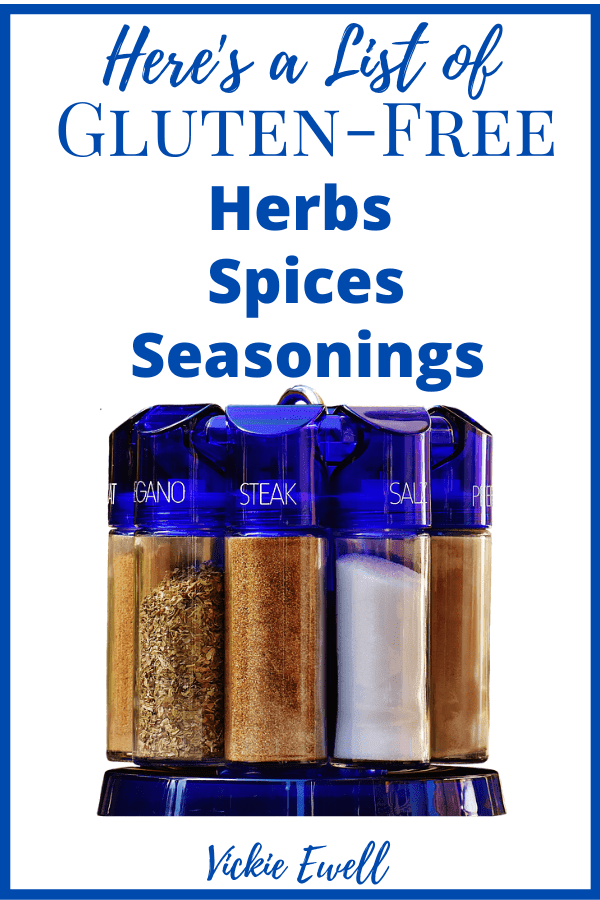
Are all herbs and spices gluten free?
No.
The dried herbs and spices you can get at your local grocery store, including those that contain only a single herb or spice, can be cross-contaminated with gluten.
When it comes to herbs and spices, the amount you use is as important as the type. In general, herbs and spices are not used in quantities that a celiac would find problematic, so those that contain up to 20 ppm should be okay for the typical celiac.
However, that doesn't hold true for those who are super sensitive to gluten.
These individuals need to seek out herbs and spices that are less likely to have been contaminated or those that have been certified to be gluten free.
Designing truly gluten-free meals can be a bit timely. Especially, when you consider that the seasonings, spices, and herbs you use on a daily basis must also be gluten free.
Gluten-free spices, seasonings, and herbs are easy to find at any grocery store. However, only single ingredient spices and herbs are said to be naturally gluten free.
If you're used to buying combinations of spices, quick-and-easy seasoning mixes, all-purpose seasonings, dry marinades, or cheap, off-brand herbs and spices, you might need to switch to a different brand or completely change the way you season your food by growing your own.
If you're new to cooking gluten free, or have determined that you're a super sensitive celiac and need to rethink the way you flavor your meals, here's what you need to know about gluten-free spices, herbs, and seasonings.
Designing truly gluten-free meals can be a bit timely. Especially, when you consider that the seasonings, spices, and herbs you use on a daily basis must also be gluten free.
Gluten-free spices, seasonings, and herbs are easy to find at any grocery store. However, only single ingredient spices and herbs are said to be naturally gluten free.
If you're used to buying combinations of spices, quick-and-easy seasoning mixes, all-purpose seasonings, dry marinades, or cheap, off-brand herbs and spices, you might need to switch to a different brand or completely change the way you season your food by growing your own.
If you're new to cooking gluten free, or have determined that you're a super sensitive celiac and need to rethink the way you flavor your meals, here's what you need to know about gluten-free spices, herbs, and seasonings.
Wheat in All-Purpose Seasonings and Mixes of Herbs and Spices
At one time, many manufacturers put wheat in their all-purpose seasonings or ground spices to keep the mix from clumping. While most brands today use silicon dioxide, sodium aluminum silica, or calcium silicate, some cheaper, off-brand products still use wheat.
I discovered this the hard way.
I was getting continuously glutened and it turned out to be an off-brand of seasoning salt that had wheat in the list of ingredients.
With the rise in gluten-sensitivity awareness, and more individuals being diagnosed with celiac disease, many manufacturers have reformulated their products to keep up with the demand for gluten-free options.
When purchasing a seasoning blend, carefully check the label.
Since wheat is one of the top eight major allergens, if a manufacturer has added wheat to their product, it must say so on the label.
However, many manufacturers do not understand the seriousness of cross contamination, so you also have to beware of those who claim their products are gluten free because they do not add gluten themselves.
McCormick Spices Can Make Gluten-Free Shopping Easier
It's easier, quicker, and safer to stick to major brands that you know are safe. For example, McCormick has a good reputation within the gluten-free community for not hiding gluten beneath the general terms of “natural flavoring” and “spices” on the label.
Most of those with celiac disease or gluten sensitivity recommend McCormick to newbies above all other brands.
However, that's more for convenience.
Along with gluten-free concerns, additional allergies and food sensitivities, such as corn or soy, also need to be considered when choosing your herbs and spices.
While McCormick is known to be gluten free, many of their products are contaminated with corn.
In addition, The Spice House replaced the wheat in their products with corn masa and corn flour, but all of their products except for The Glace de Canard Gold (a duck sauce) are free of soy.
5th Season Brand and Spice Classics Brand Herbs and Spices
Name brands can get expensive, especially when you add in the other ingredients needed for gluten-free cooking.
When you replace wheat flour in your gluten-free baked goods with other whole-grain or white-rice flours, you need to add additional seasonings and extracts to replace the missing flavor of wheat.
The 5th Season brand sold at Walmart costs quite a bit less than other brands. The Spice Classics brand can also be found at various retailers. These two brands are actually older McCormick spices that McCormick has repackaged to sell at a lower cost.
While older seasonings are weaker, a bit faded, and less flavorful when compared to major brands, if you're on a strict budget, they make a great alternative.
At less than 25 percent of the price of other brands, I've found them to be extremely cost effective even though you do need to use a heavy hand.
Keep in mind that the definition of “gluten free” is up to 20 ppm, which in general, will be too much gluten for super sensitives.
What are the Issues for Cross Contamination?
Although single ingredients are inherently gluten free, cross contamination can be a serious problem for those who are extra-sensitive to gluten. The same holds true for some of the major brands of herbs and spices.
While many companies openly declare gluten on the label, any herb or spice that is not certified to be gluten free may not be safe for super-sensitive celiacs.
For example, McCormick now runs their gluten-free spices on lines separate from those that contain gluten, so the amount of trace residues might be lower; but they are still processed in the same facility as their products that contain gluten.
For those super sensitive to gluten residues, this might very well be a problem.
Spice Islands and Tones are made by the same company as Durkee and often come packaged in huge, economical-sized containers. Single ingredient spices from all three companies are processed on dedicated lines, but like McCormick, they are not packaged in dedicated facilities.
So, not all of their herbs and spices are safe for everyone.
The good thing is that if wheat is used in some of their seasonings, it will be clearly stated on the label.
Mrs. Dash salt-free seasonings are produced on gluten-free dedicated lines, but they too are packaged in a facility that also packages products that contain wheat.
Mountain Rose Herbs, available online, comes with a good reputation among those who are extra-sensitive to gluten or corn, but they are not marked gluten free.
While all of these companies take every precaution to ensure their product's safety, and have extensive cleaning practices, they cannot guarantee their products are 100 percent gluten free.
If you need seasonings that are produced in a gluten-free facility, and therefore guaranteed, you can buy them online through Penzy's Spices, American Natural and Organic Spices, or Simply Organic.
While a couple of Penzy's products do contain wheat, they are packaged in a different facility from their gluten-free spices.
Here's a Huge List of Gluten-Free Herbs and Spices
The following brands are some of the most popular among those with celiac disease and gluten intolerance:
- 5th Season herbs and spices
- American Natural and Organic Spices (gluten-free facility)
- Benson's Gourmet Seasonings
- Durkee spices and herbs
- Emeril: Bam! Burger seasoning; and chicken, fish, rib, and steak rubs
- Lawry's salts and pepper seasonings
- McCormick spices, seasonings, and herbs
- McCormick Grillmates spice mixes and marinades
- McCormick taco seasoning mix
- Miss Bev's Kick-Ass Rooster Rub
- Mountain Rose Herbs
- Mrs. Dash salt-free seasonings and spices
- Penzy's spices and herbs (gluten-free facility)
- Simply Organic spices and herbs (certified gluten free)
- Spice Island spices and herbs
- Spicely Organic Spices (certified gluten free)
- The Spice House (but not “asofoetida” or “Classic French Demi Glace”)
- Tone's spices and herbs
- Weber seasonings (but not “Sweet'n Tangy BBQ Seasoning”)
Reading each label and calling the manufacturer to verify its gluten-free status is essential to ensure your safety. Especially, if you are a super-sensitive celiac and react to trace amounts of gluten like I do.
Danger of Using Gluten-Free Lists
If you are following a gluten-free diet, using online gluten-free lists can be convenient and help cut down on the amount of time it would take to do the work yourself.
I get that.
However, many of the online lists for gluten-free seasonings, foods, and personal care products are outdated.
Keep in mind that lists only offer you a good starting point from which to begin your own personal research. One product at a time. Never think of these lists as being all-inclusive and guaranteed to be accurate.
Label reading is essential each and every time you buy something.
Ingredients and recipes change from time to time.
But labels can also be confusing.
Although, all major allergens are required by U.S. law to be listed on the label, gluten and barley are not major allergens. Wheat will be listed, but barley and rye might not be.
Neither can you be assured that your herbs and spices are gluten free if there is no allergen statement on the product. Nothing short of your own personal detective work can guarantee that the herbs and spices you choose are safe for you.
That depends on how sensitive to gluten you actually are.
Growing your own herbs and snipping off the amount you need will give you the best flavor, but for those who are super sensitive to trace amounts of gluten, growing your own just makes sense.
In addition, grinding your own spices or crushing your own dried herbs can also be a wise choice. Whole herbs and spices do not have anti-caking ingredients to worry about, but they might still be packaged in non-dedicated facilities, which is why many super sensitives choose to grow their own.
I tried doing that a couple of years ago, but it was so hot here in Texas during the summer that the herbs didn't make it.
I did get a decent harvest, before losing them, which I'm still using by the way, but I am supplementing what I grew and dried with a few carefully chosen spice and herb brands, as well.
Do You Need to Grind Your Own Spices?
That depends on how sensitive to gluten you actually are.
Growing your own herbs and snipping off the amount you need will give you the best flavor, but for those who are super sensitive to trace amounts of gluten, growing your own just makes sense.
In addition, grinding your own spices or crushing your own dried herbs can also be a wise choice. Whole herbs and spices do not have anti-caking ingredients to worry about, but they might still be packaged in non-dedicated facilities, which is why many super sensitives choose to grow their own.
I tried doing that a couple of years ago, but it was so hot here in Texas during the summer that the herbs didn't make it.
I did get a decent harvest, before losing them, which I'm still using by the way, but I am supplementing what I grew and dried with a few carefully chosen spice and herb brands, as well.



Comments
Post a Comment